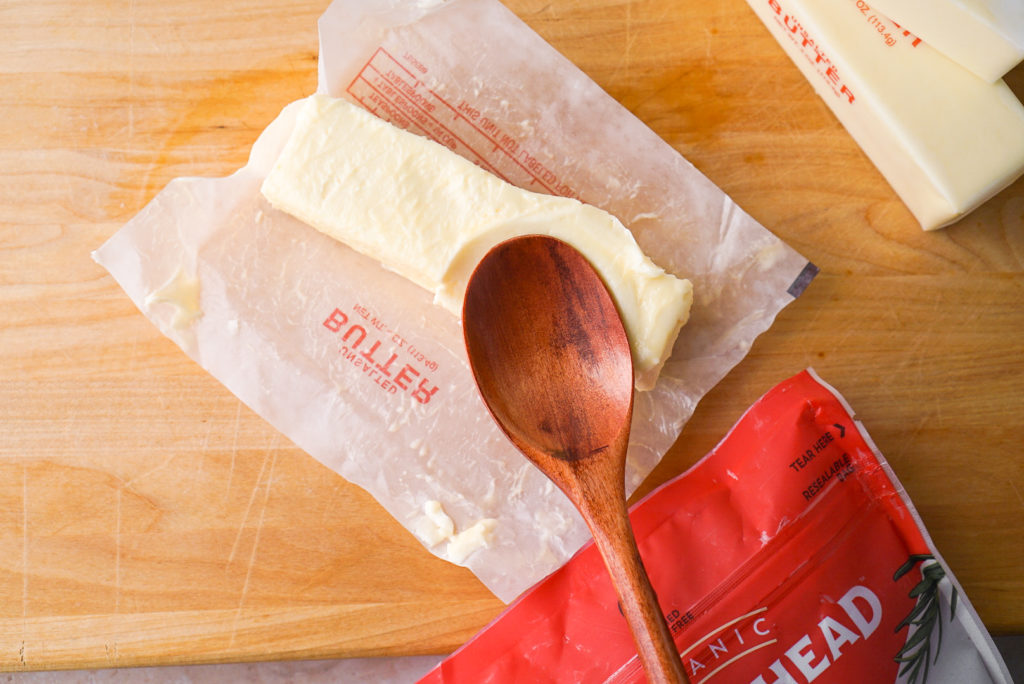Is It Safe to Store Butter On The Counter?
What you have to know about storing room temperature butter and how to safely do so.
If you’re here, you’re most likely wondering if it’s safe to leave butter on the counter or not. Leaving butter at room temperature has been quite the debate, and the internet seems inconsistent on this topic. But, if you’re like us, you love the idea of readily available softened butter for your morning toast. So, we went digging to find the answers, and here’s what we found.

What Do Food Scientists Have To Say?
Unlike its dairy counterparts, the SFS (State Food Safety) doesn’t consider butter to be categorized as a TCS (Time/temperature Control for Safety) food. This is because most butter goes through pasteurization, which heats liquids at high temperatures for short amounts of time and kills harmful bacteria. Butter also consists of at least 80% fat, and bacteria needs water to grow. Since butter is mostly fat, it creates a barrier that makes it almost impenetrable to bacteria. Another factor determining how long butter is safe to be left on the counter is the presence of salt. Salt acts as a preservative because it reduces the activity of water in food. We know that water is essential in the growth of bacteria, so without salt, we’re leaving our butter open for business for these organisms.
How Long Can I Store Butter at Room Temperature?
This topic is where things get tricky, and the internet says many different things. Some say butter can only be left out for two days, others say 1-2 weeks, and others say far beyond that. So, we searched high and low to find trusted sources explaining how long butter can be stored at room temperature. During our scavenging, we found the reports of an experiment that tested the presence of yeast, mold, and bacteria in butter left at room temperature. Over 21 days, butter was kept around 72℉ and inspected under a microscope. After three weeks, the lab reported that the butter had an increase in bacteria but was still within the safe zone to consume. We also found another extensive study that tested the taste of butter after being on the counter at room temperature for varying amounts of time. Salted butter’s flavor did not change significantly after seven days, but unsalted butter started to change after four. So, with that information, even if it’s safe to consume, it may not always taste the best, and we say trust your gut. If your butter looks suspicious, has a distinct smell, and tastes off, don’t think twice — throw it out! Otherwise, butter seems safe to consume even after a significant amount of time if stored properly.
So, How Do I Store Butter at Room Temperature Properly?
Okay, we know now that butter is good for at least 4-7 days and upwards of 3 weeks. So what can we do to ensure it stays that way? Food becomes spoiled when exposed to light, heat, and oxygen. You can combat these factors by storing your butter in a clean, airtight, opaque container like a butter boat, bell, or butter dish. Keep it away from food that could potentially contaminate it and away from direct sunlight or other heat sources. Butter should only be left on the counter if the room temperature stays below 75℉. We also recommend considering how much butter you use within a few-day window and only leaving enough out to prevent wasting. Otherwise, we recommend alternative ways to store butter.
How Can I Tell When My Butter Is No Longer Safe To Consume?
An easy way to tell if your butter has started to go bad is by looking at it. Butter going rancid will change color from off-white to yellow and brown. It will also have a change in texture. If you see mold, you should immediately throw it out. But if you can’t tell by looking at it, smell it. Rancid butter will start to smell like sweaty feet, rotten cheese, or even vomit. If all else seems fine, the final test is to taste a small portion. Butter that has gone bad will have a sour-bitter taste. If the butter passes all these tests, you can feel confident that it’s still safe to consume.
The Take-Away
If you’re new to storing room-temperature butter, your safest bet is simply to follow our recommended practices. Use salted butter instead of unsalted, and make sure to store your butter properly. “Safety first” should always be your priority when handling food. Trust your gut. If it doesn’t feel right, err on the side of caution.
 VIEW ALL PRODUCTS
VIEW ALL PRODUCTS 
